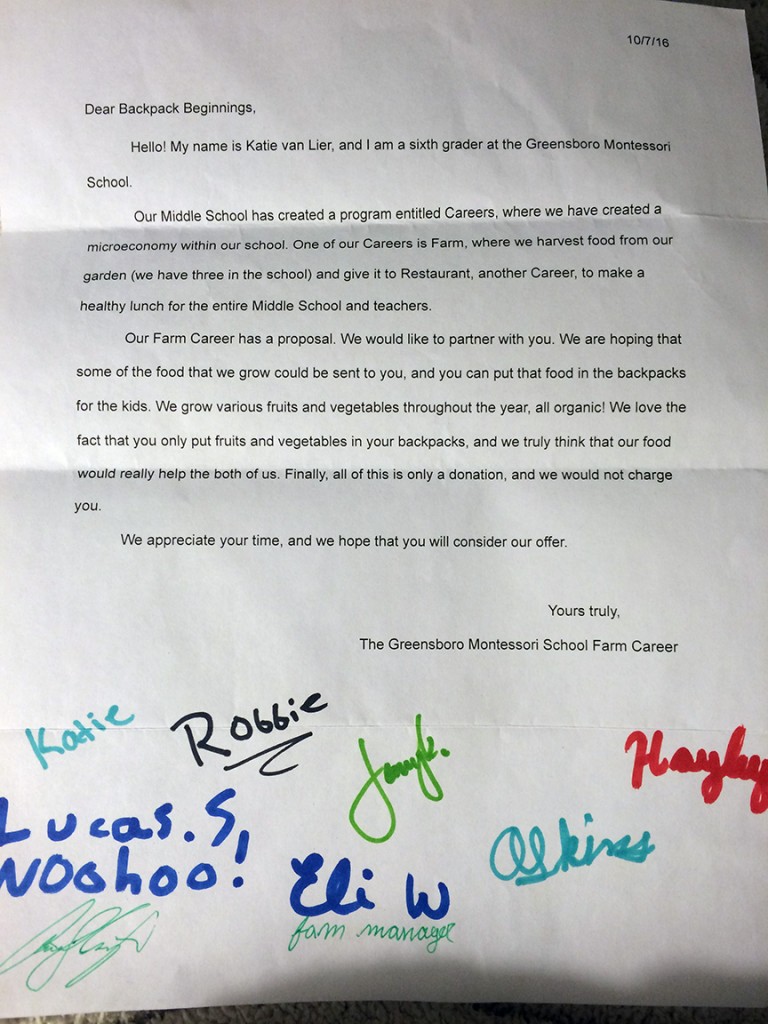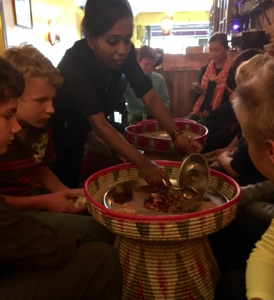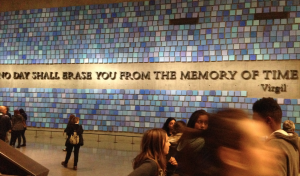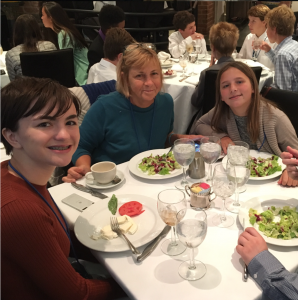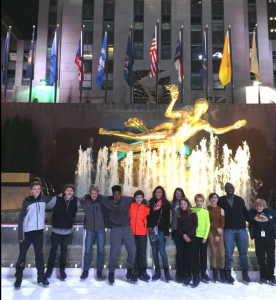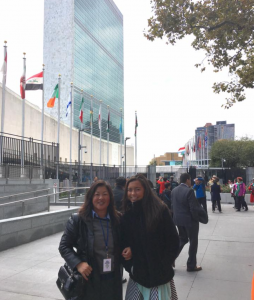With Greensboro Montessori School's tuition payments dedicated to covering Greensboro Montessori School’s operating expenses, grants from the Annual Fund provide the necessary resources to make our School more than excellent - to make us truly exceptional. Through the benevolence of parents, alumni, community partners and friends of the School who give to the Annual Fund, Greensboro Montessori School is able to award grants biannually to teachers and students with specific classroom needs or transformative ideas or both!
Current year grants are funded by the previous year's giving. Contributions generously given and humbly received from last year's Annual Fund have begun taking shape through five grants awarded this fall. They range from simple classroom enhancements for our littlest students to significant technology investments for our elementary programs to supplies for creating a new ecosystem on campus (starring chickens) for our oldest scholars.
- Better Sleep for Growing Toddlers: The Academic-Day Toddler class received three new, high-quality Roman shades with blackout liners to help students get better sleep during nap time. While shades may seem simple to us, anything to promote sleep for our littlest students is transformative. The National Sleep Foundation says, "sleep is especially important for children as it directly impacts mental and physical development...During the deep states of [Non-Rapid Eye Movement] sleep, blood supply to the muscles is increased, energy is restored, tissue growth and repair occur, and important hormones are released for growth and development.
- Reading and Technology Resources for Lower Elementary: With four new Dell Chromebooks and a Raz-Kids subscription, the Lower Elementary program has increased access to age-appropriate, education-based technology. With dedicated laptops in the classroom, students will learn techniques for effective and safe online research and word processing skills. They will also be able to easily practice coding and have seamless access to their Raz-Kids online reading comprehension program. Furthermore, the use of PCs in Lower Elementary prepares students to be "bilingual" in the computer world. In many instances, we as adults use Apple products at home and PCs at work, or vice-versa, so ensuring our student have access to both platforms is important.
- iPads for Elementary Artists: In a continuation of Katherine Gwynn's exploration of the symbiotic relationship between creating with technology and hands-on art making, Greensboro Montessori School's art studio is now home to five iPad Airs and an iPad Pro. Students will integrate drawing, painting, digital photography, digital storytelling, animation and more through these new resources exclusive to our art curriculum.
- Chickens for Middle School Entrepreneurs: After 18 months of planning by students in the R&D (research and development) career track, the Middle School is developing a new ecosystem on campus for chickens. Working closely with Aubrey Cupit, Greensboro Montessori School's garden manager and owner of Gate City Harvest, Middle School students are building a mobile chicken coop, complete with a heat lamp, waterer and feeder for six chickens. Egg production will support the Land Lab, Maria's Café and other microeconomy programs. The coop will also include a technology cart with solar panels to power the coop's heat lamp. The mobile solar panels will also complement science lesson and provide a new power source at the Land.
- Ice for Bumps, Bruises, Food Prep, Entertaining and More: Until recently, we've been stocking our freezer with bags of ice. With a new industrial-grade ice maker, we've traded-out the ongoing cost of purchasing ice with a once-time cost to help us make it on our own (how Montessori of us)! The new ice maker supports the entire student-population ensuring a relatively unlimited supply of ice packs for minor student injuries. This resource will also keep our water and lemonade cold for guests at community events like the Fall Festival, Green & White Bash and End of the Year Pizza Party. Lastly, the Middle School will enjoy easy access to ice for Maria Café and trips to the Land.
Our fall grants are as varied as they are inspiring, but there are two things which bind them all. They are not only the result of giving, but also the reason for giving.
For everyone who has given in the past, is giving today or will give in the future, thank you for supporting Greensboro Montessori School. We are who we are because you have invested in us, and we promise to pay it forward by investing everything we can and all that we have in our students.
We all know about the many benefits of reading books with your child each day. But did you know that children also reap incredible rewards when we put the books aside and tell stories the old-fashioned way, in the ancient oral tradition? Many parents are surprised to learn that even young toddlers can sustain attention for extended periods of time to stories told aloud - without pictures, screens or sound effects. Here are just a few of the benefits of storytelling:
- Builds language skills by enabling toddlers to focus on vocabulary, inflection, dialect, and plot elements without distracting stimuli
- Enhances imagination as children form their own mental images of characters and events
- Builds listening and attention skills, preparing children for longer and more complex lessons as they progress through school
- Develops memory skills, as children retain character names, traits, and events without the assistance of visual aids
- Promotes bonding between the child and the caregiver
We don't have to have an encyclopedic knowledge of folk tales to begin telling stories aloud. Old standbys like The Three Bears, The Gingerbread Man, and Red Riding Hood delight today's toddlers just as they have for generations. We can even share family anecdotes, or stories about things that happened to us as young children. This wonderful article from the National Association for the Education of Young Children has more information and tips for choosing tales to share with your child: Oral Storytelling: Building Community Through Dialogue, Engagement and Problem Solving
In Upper Elementary science classes this trimester, our fourth and fifth level students have completed an in-depth unit on the human brain. They began by studying the different parts of the brain and their specific functions, and then they applied their new knowledge to learn how to strengthen their own brains. These 10 and 11 year olds took their studies one step further and delved into what current brain research teaches us about how we can maximize our own learning.
Students explored the seminal research of Stanford University professor, Dr. Carol Dweck, who coined the term "growth mindset." Dweck's research reveals that student achievement is directly related to a person's beliefs and attitudes about the value of hard work. Our Upper Elementary students learned about the attitudes that comprise a growth mindset and discussed how their own beliefs and attitudes affect their ability to learn.
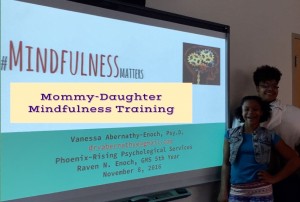 As a culminating activity, Upper Elementary hosted a special workshop on the practice of mindfulness as a tool to optimize brain function and reduce stress. The workshop was developed and presented by classmate Raven Enoch and her mother, Dr. Vanessa Abernathy-Enoch. This mother-daughter team shared a multi-media presentation on how the brain and body react to stress and the common sources of stress. They also led the students and faculty in basic mindfulness exercises they can use at home and at school.
As a culminating activity, Upper Elementary hosted a special workshop on the practice of mindfulness as a tool to optimize brain function and reduce stress. The workshop was developed and presented by classmate Raven Enoch and her mother, Dr. Vanessa Abernathy-Enoch. This mother-daughter team shared a multi-media presentation on how the brain and body react to stress and the common sources of stress. They also led the students and faculty in basic mindfulness exercises they can use at home and at school.
To learn more about how to promote mindfulness for yourself and your child, check out this booklist.
To recap their presentation and to demonstrate the importance of parent-child conversations about healthy living, we invited Raven (fifth level student) to interview her mom on the practice and health benefits of mindfulness. See the interview below.
Raven: Mom, what is Mindfulness?
Vanessa: In our workshop, #MindfulnessMatters, we talked about mindfulness as a mental state of awareness and the practices that promote such awareness: a moment-by-moment awareness of our own experience (e.g., thoughts, feelings, bodily sensations and surrounding environment) without judgement.
Raven: How does Mindfulness help with stress?
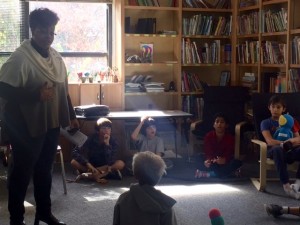 Vanessa: Well, stress is a normal part of life and a necessary part of growing, even in childhood. Stress is simply our AUTOMATIC physical and emotional reaction to life's demands or challenges. Healthy amounts of stress can motivate us to take action. Chronic stress can lead to distress and eventually different types of problems and even illness (e.g., physical, interpersonal and mental). When life's demands exceed our ability to cope with those demands, it can be taxing to our body and mind. Mindfulness practices help to target our automatic and involuntary stress response to prevent or reduce the negative impact of stress and increase coping. Some of our automatic responses to stress include trouble concentrating, inability to relax, muscle tension, and increased heart rate.
Vanessa: Well, stress is a normal part of life and a necessary part of growing, even in childhood. Stress is simply our AUTOMATIC physical and emotional reaction to life's demands or challenges. Healthy amounts of stress can motivate us to take action. Chronic stress can lead to distress and eventually different types of problems and even illness (e.g., physical, interpersonal and mental). When life's demands exceed our ability to cope with those demands, it can be taxing to our body and mind. Mindfulness practices help to target our automatic and involuntary stress response to prevent or reduce the negative impact of stress and increase coping. Some of our automatic responses to stress include trouble concentrating, inability to relax, muscle tension, and increased heart rate.
Raven: Why is it important for kids my age to learn about Mindfulness?
Vanessa: Mindfulness and the practices that promote it can help students improve their abilities in calming their own bodies and minds. The benefits include sustaining attention, improving focus, ignoring distractions, regulating mood and emotions, improving sleep, and increasing readiness to learn. There are many, many benefits that lead to increased thriving and resiliency.
Raven: What are some exercises people can do to help with Mindfulness?
Vanessa: In our workshop we taught students a Deep Breathing exercise (slowly in through the nose and slowly out through the mouth), the 5-4-3-2-1 Relaxation Technique where you focus on your environment using 3 of your 5 senses, and an exercise in Mindful Eating.
[We were also proud to point out that Greensboro Montessori School offers students several opportunities in the course of the day to practice and promote Mindfulness, including exercise, journaling, leisure reading, listening to music, creating art and structured-free time (plus yoga in the primary program)].
Raven: How has practicing Mindfulness helped you personally?
Vanessa: Using Mindfulness practices helps me personally in many ways, including improving my memory, decreasing muscle tension, remaining calm in times of crisis and increasing assertive communication that has improved my relationships, especially with my friends and family. Most of all, it is helping me to do what I hope it will help you and your classmates do: to relate to others and myself with more warmth, acceptance and sensitivity.
Greensboro Montessori School middle school students are excited to be giving back by donating produce harvested from our gardens to BackPack Beginnings. Last Friday marked our first official donation. Students within the Farm Career from the School's microeconomy program harvested two full crates of persimmons, peppers and bags of mixed greens, slated to go to students in need from Jones Elementary.
Several weeks prior, students sent a letter to BackPack Beginnings, extending their support and stating their eagerness to work with them. Then, our eighth grade Farm Manager called Tessa Kirkpatrick, Fresh Food Coordinator at BackPack Beginnings, to arrange a pick up for Friday.
Our relationship with BackPack Beginnings offers a wonderful example of how Greensboro Montessori School's unique middle school programs prepare students to be proactive, mature communicators who are capable of adult interaction. It also illustrates how our students want our school community to experience health and well-being while also helping the Greater Greensboro community to be “full” and nourished. We plan to continue to donate weekly to the BackPack Beginnings Fresh Food Initiative and hope that this is the start of a beautiful partnership.
More about BackPack Beginnings and the Fresh Food Initiative
BackPack Beginnings is a 100% volunteer 501(c)(3) organization focused on delivering child-centric services to feed, comfort and clothe children in need. By ensuring food and basic necessities are given directly to children in need, BackPack Beginnings makes a positive and lasting impact on their health and well-being. The organization was founded six years ago by Parker White, a local mom who wanted to provide hungry children with food over the weekends. BackPack Beginnings has since expanded beyond food back packs and now includes comfort back packs, clothing pantries and food pantries.
BackPack Beginnings' food back packs and pantries are enhanced by the organization's Fresh Food Initiative. Fresh fruits and vegetables improve children’s nutrition, help prevent chronic health issues and curb childhood obesity. More and more research also points to diets rich in fresh foods improving children's ability to learn and their overall school performance.
Led by volunteer Tessa Kirkpatrick (one of our very own Greensboro Montessori School parents), the Fresh Food Initiative focuses solely on making fresh fruits and vegetables available to children in need. Tessa coordinates with multiple agencies, churches, schools and community gardens each week to gather and redistribute fresh food throughout the county. Since July 1, 2016, the Fresh Food Initiative has distributed over 10,000 pounds of produce.
GMS: Tell us how your trip started
Jean-Lou: On Sunday we flew to New York. After we checked in at our hotel, we met some of the students from other schools. There were eight or nine other Montessori schools from different states and also the Dominican Republic. There were over 150 students at the conference.
Isabel: For most of the day on Monday, we heard presentations from many different NGOs [non-governmental organizations] about the work they are doing to help people around the world. Some of the organizations were Save the Rain, Vision For and From Children, Room to Read, and HeForShe.
Click Here to view a brief clip from the NGO presentation forum. Excerpt provided by chaperone, Joan Tao.
Jean-Lou: That day at lunch we went to an Ethiopian restaurant and for dinner we ate at a Moroccan restaurant. Later that night we met up with kids from two of the other schools and had a great time ice skating in Rockefeller Center.
GMS: Was there one aspect of the trip that was your favorite or was the most memorable?
Isabel: I loved being in New York City and everything about this trip. For me, the most memorable part was visiting the 9/11 Memorial and Museum. It is hard to describe the feeling of being there, but it helped me put into perspective all of the people who lost their lives. At the memorial fountain, you can read the names of all of the people who died that day. What I thought was really cool, is that white roses had been placed by the names of people to celebrate their birthdays.
Jean-Lou: I agree that being there was hard to describe. It was just like the quote that we saw on the wall of the museum. I took a picture of it with my camera. “No day shall erase you from the memory of time.”
GMS: Tell us about your tour of the United Nations building.
Jean-Lou: We visited the General Assembly Hall and an art exhibit about clearing land mines. We saw lots of different rooms and sculptures in the United Nations building and each had been contributed by a different country. On Tuesday, we also met with delegates from the Sierra Leone mission. One of the reasons we chose their mission is because our class will be reading the book, A Long Way Gone, later this year. It's a memoir of a boy growing up during the civil war in Sierra Leone.
Isabel: The delegates from Sierra Leone told us about the history of the country and how it was founded by Portuguese explorers who gave the country its name. It means “lions in the mountains." We learned about the civil war that broke out in the 1990s and then how the Ebola epidemic impacted the country a few years ago.
Jean-Lou: Before the Ebola outbreak, they had a rapidly growing economy, but then, all of the international companies withdrew. They made some very strict health rules to help control the spread of the disease. The delegates told us about their country's current president, Ernest Bai Koroma, and how their economy is starting to recover. It was sad to learn that after the Ebola epidemic many of the children were left without parents. But the delegates told us that in Sierra Leone there is a belief that everyone in the village is responsible for raising every child.
GMS: Tell us more about what you learned from the non-governmental organizations
Isabel: Many of the people giving the presentations were college students and that made me realize you don’t have to be an adult to make a difference. Actually, there was a 15 year old girl who told us about the organization called Vision For and From Children.
GMS: Have you thought about which organization you will choose for your follow-up presentation to the community?
Jean-Lou: I hope to do my presentation on the organization Room to Read that was started in Nepal. I was surprised to learn there are schools around the world where the children don’t have any books to read. This organization provides books for schools to help children learn to read in their native language. The organization also works with the governments in those countries to help teachers and also supports the education of young girls.
Isabel: I am planning to do my presentation on HeForShe which builds awareness about the issues of gender equality and specifically getting men and boys involved in the pursuit for gender equality. I also think its cool that Emma Watson [British actor from the Harry Potter movie series] promotes this cause and is the UN Goodwill Ambassador for women.
GMS: How will you stay connected to this experience and share it with you classmates.
Jean-Lou: At the end of the conference we voted to decide which organization we would work together to support. We chose Save the Rain which builds water catchment systems for villages that don’t have clean drinking water. To start, we are planning to use the money we raise through the Middle School Rock-a-thon and the proceeds from the lunch we serve at the Greensboro Montessori School International Fair to donate to Save the Rain.

